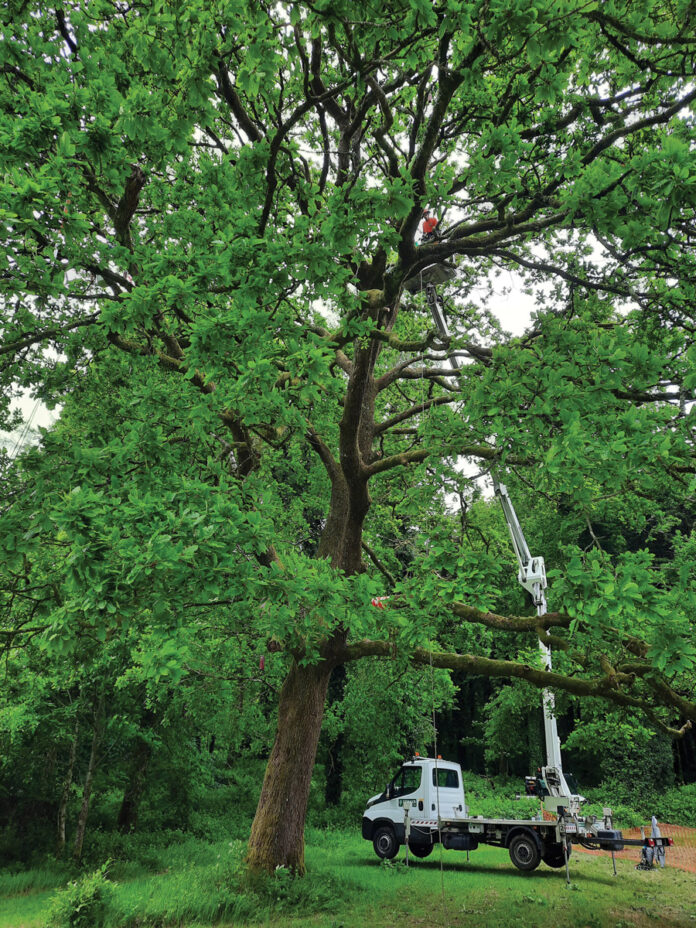With the QQI Level 6 Advanced Certificate in Arboriculture, you can advance your career or business whilst supporting Ireland’s green infrastructure, writes Jeremy Ryan, coordinator of the National Arboriculture Apprenticeship Programme.
Arboriculture professionals play a crucial role in maintaining and expanding Ireland’s tree resources, which in turn provide wide ranging economic, social, environmental, and ecological benefits. Arboriculture not only creates employment but also enhances recreation, tourism, and connection with nature. Professional arborists also play a crucial role in preserving our historic and cultural landscapes.
Maintaining and expanding the nation’s tree and amenity woodland resource is integral to national and local development strategies. These strategies aim to protect soils, mediate stormwater surges, provide urban green infrastructure, conserve biodiversity, and sequester atmospheric carbon. However, these benefits face challenges such as novel pathogens, insensitive urban and rural development, and the slow increase in high wind weather events, which affect the health and stability of trees. These conditions pose risks to transport and energy infrastructure, built property, and human life.
DEVELOPMENT OF ARBORICULTURE EDUCATION IN IRELAND
The sustainable management of our national tree and amenity woodland resource is dependent upon a large cohort of highly skilled and trained arborists.The action plan to expand apprenticeships and traineeships in Ireland presented an opportunity for non-craft sectors to develop apprenticeships that better reflect modern professional occupations. In response, the QQI Level 6 National Certificate in Arboriculture was created by industry stakeholders and state actors in collaboration with the Galway and Roscommon Education and Training Board (GRETB).
Launched as an apprenticeship in 2021, the arboriculture cert aims to standardise arboriculture education in Ireland, equipping learners with the necessary knowledge, skills, and competencies to attain the QQI Level 6.
The programme offers an internationally recognised qualification that is both academically rigorous and vocationally relevant. Its goal is to enhance apprentices’ understanding of arboriculture theories and practices, thereby improving their employability. Additionally, it prepares apprentices for progression to higher education or specialised vocational training, thus supporting educational standardisation in the sector.
To be eligible for the programme, prospective apprentices must be employed by a SOLAS approved employer, be at least 18 years old, hold a Level 4 Award (or equivalent) or have 12 months of relevant land-based experience.
A key feature of the apprenticeship is the ‘earn as you learn’ model, where apprentices receive an allowance from their employer during the programme. This model prepares graduates not only for career advancement, but also for further education. The current cohort includes male and female school leavers, career changers, and experienced individuals who are already working in tree and amenity woodland management.
RESPONSIBILITIES OF APPRENTICES AND EMPLOYERS
The Code of Practice for Employment of Apprentices outlines the standard contract, informing both apprentices and employers of their respective duties and responsibilities. Approved employers must provide workplace experiences that help apprentices to develop the required skills, knowledge, and competencies. From an employer’s perspective, the apprenticeship is a cost-effective way to develop talent within the business. Apprentices gain valuable experience and qualifications while contributing to the business’s productivity.
As apprentices become more proficient, they help increase productivity by undertaking a diversified range of duties and tasks. This process not only allows employers to develop their future workforce but also improves staff retention, engagement, and efficiency. Employers who participate in the apprenticeship programme become members of a national network of approved employers and contribute to the programme’s future development.
Each apprentice is assigned a workplace mentor, a qualified and experienced professional committed to helping the apprentice achieve their potential. The mentor acts as a role model and guide, supporting the apprentice in the workplace learning environment and providing direction for completing workplace tasks.
FINANCIAL AND EDUCATIONAL SUPPORT
One significant advantage of the apprenticeship scheme for employers is the substantial cost savings involved. GRETB provides fully funded theoretical education and support across various relevant subjects, as well as skills training and certification in 11 specific competencies. The programme includes intensive two-week training blocks, after which apprentices return to their employers for three to four weeks. Theoretical and skills training takes place at the GRETB Petersburg Outdoor Education and Training Centre (OETC) in Clonbur, County Galway, and the surrounding parkland and Coillte forests.
32 apprentice positions will be available every year. In May 2023, the first class of apprentices graduated from the programme, with a second class graduating in November 2023. Most graduates have remained with their apprenticeship employers but now occupy more senior positions, such as arboricultural team leaders, contracts managers, or trainee consultants.
AN APPEALING CAREER CHOICE
As the sole provider of arboriculture education in Ireland, our mission is to ensure a steady and sustainable influx of new professionals into the field, regardless of their background or previous experience. We are dedicated to offering numerous opportunities for individuals to establish long, rewarding careers focused on Ireland’s trees and amenity woodlands. By promoting arboriculture as a profession, we aim to reshape perceptions, making it an appealing and diverse career choice for school leavers or those considering a career change.
The QQI Level 6 Advanced Certificate in Arboriculture serves as a crucial stepping stone, equipping individuals with the skills and knowledge necessary to embark on a fulfilling career. Those transitioning from horticulture to arboriculture have the opportunity to leverage existing plant knowledge, while expanding into tree-specific skills essential for urban and rural tree management.
For those considering a career in arboriculture, here are some potential pathways, including details of the educational and experiential requirements needed to achieve your career goals.
SEMI-MATURE NURSERY STOCK PRODUCTION
The nursery sector is the backbone of arboriculture, responsible for nurturing the variety of trees essential for maintaining our historic parks, gardens, amenity woodlands and (sub)urban landscapes.
Cultivating large, semi-mature trees for transport across Ireland requires a deep understanding of arboriculture and extensive professional experience. This includes expertise in soil science, dendrology, tree biology, and proficiency in tree pruning and surgery, both above and below ground.
Our apprenticeship students benefit from a comprehensive curriculum that covers both theoretical knowledge and practical skills. This includes seed tree and provenance selection, seed harvesting and storage, and effective tree production methods, all taught at our purpose-built nursery facility.
CLIMBING ARBORIST
The role of a climbing arborist is highly specialised, requiring advanced skills in tree climbing and conducting tree surgery and dismantling tasks. These professionals are critical in maintaining tree health, safety, and aesthetics. Climbing arborists handle diverse responsibilities, from pruning and shaping to tree felling and disease control.
As apprentices, our students work closely with experienced teams, receiving hands-on training in tree climbing techniques, equipment handling, safety protocols, and tree pathology. The demand for competent and qualified climbing arborists remains very high across Ireland.
UTILITY ARBORIST
In the Utility Vegetation Management (UVM) industry, arborists ensure the safe and efficient delivery of essential utilities like electricity, communication, and transportation infrastructure. Utility arborists must have a comprehensive understanding of UVM programmes, industry best practices, and environmental stewardship principles.
Utility arborist tasks may include assessing vegetation along utility line easement strips, obtaining necessary permissions, and operating specialised off-road equipment for vegetation removal. Through our apprenticeship program, students gain practical experience in tree climbing and operating mechanised equipment, preparing them for the challenges of working at heights in various high-risk environments.
TREE AND WOODLAND OFFICER
Tree and woodland officers, also known as arboricultural officers, work for local authorities to safeguard tree populations and enhance their environmental and wildlife benefits. Their responsibilities include protecting trees during development and demolition projects, and from pests, diseases, and mismanagement, as well as designing and overseeing new tree planting projects.
Arboricultural officers engage with stakeholders such as residents, community groups, developers and policymakers, promoting the importance of green infrastructure. During emergencies like storms, tree officers prioritise maintenance tasks based on public safety concerns. The number of tree officers is expected to rise steadily, reflecting the growing emphasis on environmental conservation and sustainable (sub)urban landscapes.
CONSULTANT ARBORICULTURIST
A consultant arboriculturist is a seasoned professional who provides expert management advice on trees, particularly where trees contribute to public enjoyment and well-being.
Consultants assess tree health and hazards, offer recommendations for tree care, and may investigate cases involving trees and structural damage or accidents. They also provide guidance on planning regulations, tree preservation laws, and tree protection. Some of our students serve their apprenticeships with independent arboricultural consultancies, aspiring to pursue higher education and advance to consultancy roles upon graduation.
Arboriculturists are increasingly called upon to help preserve Ireland’s veteran and ‘champion’ trees – exceptional examples of their species because of their enormous size, great age, rarity or historical significance. These trees are not only natural wonders, but also hold significant cultural and ecological value.
Ireland’s arboreal heritage is rich and diverse, with many thousands of champion trees now recorded. Arboriculturists play a vital role in protecting these trees, advising on proper care, assessing health risks, and advocating for their continued preservation.
NURTURING IRELAND’S TREES
Arboriculture offers a dynamic and fulfilling career with diverse opportunities for growth and meaningful environmental impact. Whether your interests lie in nursery production, tree climbing, utility management, consultancy or conservation, the field welcomes passionate individuals committed to nurturing and preserving Ireland’s arboreal heritage and treed landscapes. ✽
 JEREMY RYAN is a coordinator of the National Arboriculture Apprenticeship Programme. For more on the arboriculture apprenticeship programme, contact jeremy.ryan@gretb.ie
JEREMY RYAN is a coordinator of the National Arboriculture Apprenticeship Programme. For more on the arboriculture apprenticeship programme, contact jeremy.ryan@gretb.ie




